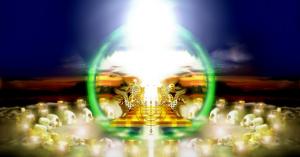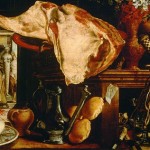 Matthew 24:15-28
Matthew 24:15-28
Something of supreme significance happened in the 1st century A.D. It would be easy to read it as we might any other event in history, that is, with a yawn and a reach for the remote control. Julius Caesar was murdered in 44 B.C., we read. At the battle of Thermopylae in 480 B.C. the vastly outnumbered Greeks held back the Persians for three days in one of history’s most famous last stands. Interesting. Now let me get on with my real life.
But I tell you that in the 1st century A.D. something of extraordinary significance happened. In fact, over a 70-year period, a series of most amazing and significant things happened. At the time, it would have been easy to miss. It was done in a corner of the Roman Empire that may not have seemed particularly important at the time. In a small village outside Jerusalem, in the province of Judea one that some called the King of the Jews was born. Thirty years later, He gathered a small following before he was put to death in another three years by the Romans.
Of course, something much more dramatic happened 40 years later. In A.D. 66 the Jews had revolted against the Romans, who sent the general Vespasian to restore order. In 68, the emperor Nero died, and Vespasian was made emperor. He sent Titus to finish the job. By the year 70, the Romans had breached Jerusalem’s outer walls and began a systematic ransacking of the city. The assault culminated in the burning and destruction of the Temple that served as the center of Judaism.
Another century, another collection of random historical facts.
Or is it? This is the way the history books might relate the cataclysm of the first century, but such an account would seriously underestimate the importance of what had just happened. When told from the perspective of God’s chosen people, the Jews, and from the perspective of the New Covenant of Jesus Christ, such events would look very different indeed.
From the perspective of the first century Christians (who were mostly Jews), the events of the first century would have seemed like the dramatic death of an entire world and the tumultuous birth of a new one! It would have seemed the greatest tribulation the world had ever known or ever would. Such an estimation wouldn’t be based on a mere counting of the dead. In that case, the Holocaust of the 20th century would have been much worse. Of course, based on mere numbers, the Holocaust wouldn’t have been the worst calamity ever: Hitler killed his millions, but Stalin and Mao their tens of millions.
No, in the first century an entire world, the world of the Old Covenant which had existed for 2000 years, died. Nowhere was this more dramatically symbolized than in the destruction of Jerusalem, the city of David, and especially the destruction of the Temple, the center of worship and the religion of the Old Covenant. In fact, with the destruction of the Temple, the Old Covenant could not survive, based as it was on the sacrificial system that was necessary for salvation but which had now been sacrificed.
But as terrible as this slaughter and destruction were (go read Josephus if you want all the gory details), in keeping with the principles of the Kingdom of Heaven, the old died so that the new may be born. As terrible as the destruction of the Old Covenant was, the birth of the New Covenant, of which Jesus Christ is the Incarnation, was even greater.
And this is one way we may measure how great is the Covenant under which we live, the Kingdom in which we live, and the King we serve: by how terrible the destruction of the Old Covenant was. By this we also know how difficult life in this kingdom will be while still in this life. As you might imagine, there was a lot of resistance to the birth of Christ and His Kingdom – and there still is.
I imagine Satan and his minions as being a particularly dangerous fire ant mound, and in the 1st century, Jesus stomped all over this mound and destroyed it. However, this aroused the fury of the ants who had been relatively quiet but now came out in full force. Wherever the Kingdom of Heaven advances, it is met by the Kingdom of Hell, and so we should not be surprised if those things which happened decisively in the first century, prophesied by Christ, are repeated in various guises throughout history.
Whoever reads Matthew 24, let him understand. What happened in the first century forever changed history and mankind. And what happened in the 1st century is still being worked out in our lives in the 21st century. Don’t be surprised, therefore, if God’s work in your life seems to meet with resistance today. Don’t be surprised when life is a mixture of good and evil.
But know this: Jesus Christ has come, and the old world has come and gone. But Christ and His Kingdom remain, and that makes all the difference in the world today.
Prayer: Our Father, who art in heaven, hallowed be Thy name. Thy kingdom come. Thy will be done, on earth as it is in heaven. Give us this day our daily bread. And forgive us our trespasses, as we forgive those who trespass against us. And lead us not into temptation, but deliver us from evil. For thine is the kingdom, and the power, and the glory, for ever and ever. Amen.
Points for Meditation:
- What are some ways you can be reminded that Christ is on His throne and His Kingdom is here?
- See today’s challenges in terms of the spiritual warfare that exists in your life.
Resolution: I resolve to spend some time thinking of Christ on His throne, preparing for the spiritual warfare I will face today.
© 2014 Fr. Charles Erlandson











